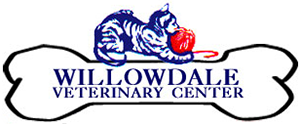Library
-
Veterinarians generally agree that there is no single best food for all dogs or all cats. Our pets are individuals: some will prefer dry kibble, while others will prefer wet or canned food. Pet owners may also have preferences related to cost, convenience of shopping, and how a particular pet food manufacturer conducts their business. This handout briefly outlines key aspects of selecting the most appropriate food and water for your dog or cat.
-
Chronic lymphocytic leukemia is a slowly progressing cancer of a type of white blood cell called a lymphocyte. It can develop at any age but is more typically detected in middle-aged to senior dogs. It also seems to be more prevalent in German Shepherds and Golden Retrievers. This disease is often asymptomatic and detected on routine lab screening. Further diagnostic procedures, as well as treatments and prognoses, are described in this handout.
-
Clonidine is a medication that is used to treat behavioral disorders in dogs, particularly anxiety or phobia-related. Give as directed. Side effects are generally mild if present and include sedation, lethargy, agitation/excitation, aggression, and constipation. Monitoring blood pressure as well as heart rate and rhythm is recommended with chronic use. If you suspect an overdose or an adverse reaction to the medication, call your veterinary office immediately.
-
Colloidal oatmeal topical (brand name DermAllay®, Epi-Soothe, others) is an anti-inflammatory, antipruritic (anti-itching), and emollient (softening, soothing) agent used in the treatment of surface skin disorders and skin reactions in cats and dogs. It is made from oat grains (Avena sativa). Colloidal oatmeal topical comes in spray, cream rinse, and shampoo forms.
-
There are many ways we can change our dog's home environment to help them more easily move around and avoid injuries. This handout reviews some key points to improve your dog's comfort at home and on car trips.
-
Crofelemer CA1, also known as Crofelemer (brand name Canlevia®-CA1), is an antidiarrheal drug used to treat diarrhea caused by chemotherapy in dogs. Crofelemer CA1 comes in delayed release tablet form.
-
Cryptosporidium is a species of single-celled parasite that can infect your dog through the gastrointestinal tract. Clinical signs such as diarrhea and weight loss may only be seen in immunosuppressed patients, including puppies. These patients may need supportive care and other treatment to control disease. Certain Cryptosporidium species can be spread between pets and humans, making this parasite zoonotic.
-
If a tooth is unerupted, it is at risk of forming a destructive dentigerous (odontogenic) cyst in the bone. Although unerupted or broken teeth can be painful, dogs rarely show obvious signs of pain. Dentigerous cysts, including and the original tooth must be removed carefully as to avoid compromising the bone, which can easily fracture during the extraction. Dentigerous cysts are preventable if unerupted teeth are addressed early in life.
-
Desoxycorticosterone pivalate (DOCP) (brand name Percorten-V®, Zycortal®) is a steroid hormone replacement therapy used to treat primary hypoadrenocorticism (Addison’s disease) in dogs. Extra-label (off-label) lower dosages of DOCP (i.e., lower dose, longer dosing interval, or both) can be used to control the balance of blood electrolyte levels. DOCP has also been used extra-label to treat hypoadrenocorticism in cats.
-
Dexamethasone ophthalmic is a topical steroid medication used to treat inflammatory eye conditions in cats, dogs, rabbits, avian species, and other animals. Dexamethasone ophthalmic may be used alone or in combination with an antimicrobial. Dexamethasone ophthalmic comes in ointment and liquid drop form. Avoid use in animals with corneal ulcerations or corneal infections.
